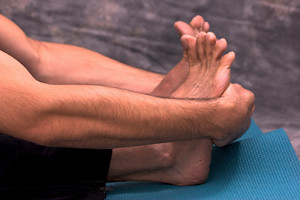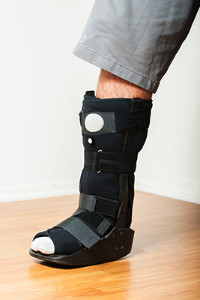Blog - Foot Doctor, Chambersburg and McConnellsburg, PA
How to Prevent Corns
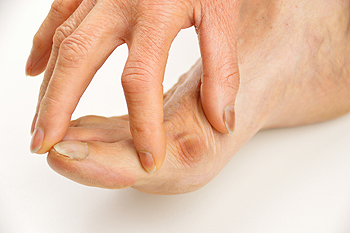 When the foot incurs abnormal pressure from wearing incorrect footwear, a corn may develop. A corn is a small area of thickened skin, usually appearing on the tops of the toes or the balls of the feet. These are typically referred to as hard corns, often producing redness, swelling, and pain. Soft corns are usually found between the toes, appearing white and having a rubbery texture. Both types of corns are produced by excessive friction, typically caused by wearing ill fitting shoes and from moisture accumulating between the toes. Many people will develop corns throughout their lives, and it is one of the most common foot ailments. It’s important to prevent corns from developing by being aware of specific areas of the foot that often endure pressure. If you stand for most of the day, it’s suggested to take ample time to find shoes that fit properly. Additionally, the skin will benefit significantly by being moisturized. Please consult with a podiatrist for a proper diagnosis and information on how painful corns can be removed.
When the foot incurs abnormal pressure from wearing incorrect footwear, a corn may develop. A corn is a small area of thickened skin, usually appearing on the tops of the toes or the balls of the feet. These are typically referred to as hard corns, often producing redness, swelling, and pain. Soft corns are usually found between the toes, appearing white and having a rubbery texture. Both types of corns are produced by excessive friction, typically caused by wearing ill fitting shoes and from moisture accumulating between the toes. Many people will develop corns throughout their lives, and it is one of the most common foot ailments. It’s important to prevent corns from developing by being aware of specific areas of the foot that often endure pressure. If you stand for most of the day, it’s suggested to take ample time to find shoes that fit properly. Additionally, the skin will benefit significantly by being moisturized. Please consult with a podiatrist for a proper diagnosis and information on how painful corns can be removed.
If you have any concerns regarding your feet and ankles, contact Dr. Steven Schwartz of Pennsylvania. Our doctor will treat your foot and ankle needs.
Corns: What Are They? and How Do You Get Rid of Them?
Corns can be described as areas of the skin that have thickened to the point of becoming painful or irritating. They are often layers and layers of the skin that have become dry and rough, and are normally smaller than calluses.
Ways to Prevent Corns
There are many ways to get rid of painful corns such as wearing:
- Well-fitting socks
- Comfortable shoes that are not tight around your foot
- Shoes that offer support
Treating Corns
Treatment of corns involves removing the dead skin that has built up in the specific area of the foot. Consult with Our doctor to determine the best treatment option for your case of corns.
If you have any questions please feel free to contact our offices located in Chambersburg, and Mcconnellsburg, PA . We offer the newest diagnostic and treatment technologies for all your foot and ankle needs.
Symptoms of Morton’s Neuroma
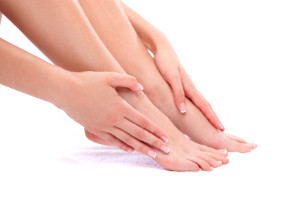 Symptoms from a condition referred to as Morton’s neuroma can include intense pain often accompanied by a feeling of pins and needles. The third and fourth toes are mostly affected by the condition, which is typically caused by the nerve being squeezed. Weak arches may be the root of the pinched nerve, and a numbing sensation may be experienced. If there is scar tissue present around the nerve, that may be a factor as well. Shoes not fitting properly and pressing against a nerve may also be a possible cause for this condition to develop. It’s suggested to cease any activity that may increase the pain, in addition to resting the foot to allow for proper healing. Some treatments involve custom-made orthotics or taping the foot to ease the discomfort associated with Morton’s neuroma. When exercises are performed that aid in strengthening the arch, relief will be felt from the reduced pressure. Schedule a consultation with a podiatrist to learn about available treatment options for Morton’s neuroma.
Symptoms from a condition referred to as Morton’s neuroma can include intense pain often accompanied by a feeling of pins and needles. The third and fourth toes are mostly affected by the condition, which is typically caused by the nerve being squeezed. Weak arches may be the root of the pinched nerve, and a numbing sensation may be experienced. If there is scar tissue present around the nerve, that may be a factor as well. Shoes not fitting properly and pressing against a nerve may also be a possible cause for this condition to develop. It’s suggested to cease any activity that may increase the pain, in addition to resting the foot to allow for proper healing. Some treatments involve custom-made orthotics or taping the foot to ease the discomfort associated with Morton’s neuroma. When exercises are performed that aid in strengthening the arch, relief will be felt from the reduced pressure. Schedule a consultation with a podiatrist to learn about available treatment options for Morton’s neuroma.
Morton’s neuroma is a very uncomfortable condition to live with. If you think you have Morton’s neuroma, contact Dr. Steven Schwartz of Pennsylvania. Our doctor will attend to all of your foot care needs and answer any of your related questions.
Morton’s Neuroma
Morton's neuroma is a painful foot condition that commonly affects the areas between the second and third or third and fourth toe, although other areas of the foot are also susceptible. Morton’s neuroma is caused by an inflamed nerve in the foot that is being squeezed and aggravated by surrounding bones.
What Increases the Chances of Having Morton’s Neuroma?
- Ill-fitting high heels or shoes that add pressure to the toe or foot
- Jogging, running or any sport that involves constant impact to the foot
- Flat feet, bunions, and any other foot deformities
Morton’s neuroma is a very treatable condition. Orthotics and shoe inserts can often be used to alleviate the pain on the forefront of the feet. In more severe cases, corticosteroids can also be prescribed. In order to figure out the best treatment for your neuroma, it’s recommended to seek the care of a podiatrist who can diagnose your condition and provide different treatment options.
If you have any questions, please feel free to contact our offices located in Chambersburg, and Mcconnellsburg, PA . We offer the newest diagnostic and treatment technologies for all your foot care needs.
How Can Wearing High Heels Affect My Feet?
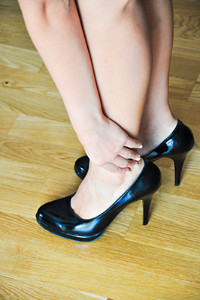 The choice to wear high heels can not only be damaging to the heel, but generally puts pressure on the front of the foot as well. Another part of the foot typically affected may be the Achilles tendon. When high heels are worn frequently, the tendon becomes shortened, and the back of the ankle may feel tight as it strains to be flexible. Arthritis may be a result of damage incurred to the joints of the feet from wearing high heels. Additionally, disorders such as bunions, corns, and a thickening of the nerves between the toes, referred to as Morton’s neuroma, may also be the result of choosing this type of shoe to wear. If you do decide to wear high heels, you can reduce the impact that’s endured by placing protective pads in the shoes. When proper stretches are performed, the foot and ankle will not only feel better, but become stronger.
The choice to wear high heels can not only be damaging to the heel, but generally puts pressure on the front of the foot as well. Another part of the foot typically affected may be the Achilles tendon. When high heels are worn frequently, the tendon becomes shortened, and the back of the ankle may feel tight as it strains to be flexible. Arthritis may be a result of damage incurred to the joints of the feet from wearing high heels. Additionally, disorders such as bunions, corns, and a thickening of the nerves between the toes, referred to as Morton’s neuroma, may also be the result of choosing this type of shoe to wear. If you do decide to wear high heels, you can reduce the impact that’s endured by placing protective pads in the shoes. When proper stretches are performed, the foot and ankle will not only feel better, but become stronger.
High heels have a history of causing foot and ankle problems. If you have any concerns about your feet or ankles, contact Dr. Steven Schwartz from Pennsylvania. Our doctor can provide the care you need to keep you pain-free and on your feet.
Effects of High Heels on the Feet
High heels are popular shoes among women because of their many styles and societal appeal. Despite this, high heels can still cause many health problems if worn too frequently.
Which Parts of My Body Will Be Affected by High Heels?
- Ankle Joints
- Achilles Tendon – May shorten and stiffen with prolonged wear
- Balls of the Feet
- Knees – Heels cause the knees to bend constantly, creating stress on them
- Back – They decrease the spine’s ability to absorb shock, which may lead to back pain. The vertebrae of the lower back may compress.
What Kinds of Foot Problems Can Develop from Wearing High Heels?
- Corns
- Calluses
- Hammertoe
- Bunions
- Morton’s Neuroma
- Plantar Fasciitis
How Can I Still Wear High Heels and Maintain Foot Health?
If you want to wear high heeled shoes, make sure that you are not wearing them every day, as this will help prevent long term physical problems. Try wearing thicker heels as opposed to stilettos to distribute weight more evenly across the feet. Always make sure you are wearing the proper shoes for the right occasion, such as sneakers for exercising. If you walk to work, try carrying your heels with you and changing into them once you arrive at work. Adding inserts to your heels can help cushion your feet and absorb shock. Full foot inserts or metatarsal pads are available.
If you have any questions please feel free to contact our offices located in Chambersburg, and Mcconnellsburg, PA . We offer the newest diagnostic and treatment technologies for all your foot and ankle needs.
Stretching the Feet for Overall Health Benefits
Implementing foot stretches in your daily routine will not only benefit the health of the foot, but also feel good. There are numerous muscles in the foot, and practicing proper stretches can aid in helping the body stay fit. Pointing and flexing your toes is an effective foot stretch, in addition to practicing a tendon stretch. This is accomplished by standing on a step with the heels slightly hanging off the edge. When your weight is shifted towards your heels, a gentle stretch is easily felt and the flexibility of your tendons and muscles is improved. Another effective stretch is done while in a sitting position and involves placing a towel under the arch of the foot. Raise and straighten the leg, and gently pull the foot toward you. This not only stretches the foot, but allows the leg to become stronger as well. While general exercise is vital for everyday health, it’s important to stretch the feet for maximum health benefits.
Stretching the feet is a great way to prevent injuries. If you have any concerns with your feet consult with Dr. Steven Schwartz from Pennsylvania. Our doctor will assess your condition and provide you with quality foot and ankle treatment.
Stretching the Feet
Being the backbone of the body, the feet carry your entire weight and can easily become overexerted, causing cramps and pain. As with any body part, stretching your feet can serve many benefits. From increasing flexibility to even providing some pain relief, be sure to give your feet a stretch from time to time. This is especially important for athletes or anyone performing aerobic exercises, but anyone experiencing foot pain or is on their feet constantly should also engage in this practice.
Great ways to stretch your feet:
- Crossing one leg over the others and carefully pull your toes back. Do 10-20 repetitions and repeat the process for each foot
- Face a wall with your arms out and hands flat against the wall. Step back with one foot and keep it flat on the floor while moving the other leg forward. Lean towards the wall until you feel a stretch. Hold for 30 seconds and perform 10 repetitions for each foot
- Be sure not to overextend or push your limbs too hard or you could risk pulling or straining your muscle
Individuals who tend to their feet by regular stretching every day should be able to minimize foot pain and prevent new problems from arising.
If you have any questions, please feel free to contact our offices located in Chambersburg, and Mcconnellsburg, PA . We offer the newest diagnostic and treatment technologies for all your foot care needs.
Foot Conditions Caused by Obesity
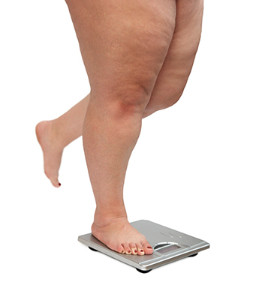 Fallen arches are a common result of being obese. The feet provide a natural support system for the body, and imbalance may occur due to the excess weight the feet must withstand. The feet may also grow in size due to excess pressure and swelling. The ankles will be surrounded by fat tissues and cells, which may cause immense pain and difficulty walking. Pressure that settles on the ankle often makes it painful to wear shoes. Bending over to put them on may be challenging because of the additional weight the body must endure. Fat and sugar deposits surrounding the ankle may weaken the structure of the foot, commonly causing serious complications and discomfort. This condition may be prevented by implementing dietary and lifestyle changes, thus improving not only the general health of the feet, but the rest of the body as well.
Fallen arches are a common result of being obese. The feet provide a natural support system for the body, and imbalance may occur due to the excess weight the feet must withstand. The feet may also grow in size due to excess pressure and swelling. The ankles will be surrounded by fat tissues and cells, which may cause immense pain and difficulty walking. Pressure that settles on the ankle often makes it painful to wear shoes. Bending over to put them on may be challenging because of the additional weight the body must endure. Fat and sugar deposits surrounding the ankle may weaken the structure of the foot, commonly causing serious complications and discomfort. This condition may be prevented by implementing dietary and lifestyle changes, thus improving not only the general health of the feet, but the rest of the body as well.
Obesity has become very problematic at this point in time and can have extremely negative effects on the feet. If you’re an obese individual and are concerned about your feet, contact Dr. Steven Schwartz from Pennsylvania. Our doctor can provide the care you need to keep you pain-free and on your feet.
Obesity and Your Feet
Since your feet are what support your entire weight when standing, any additional weight can result in pain and swelling. Being overweight is one of the main contributors to foot complications.
Problems & Complications
Extra Weight – Even putting on just a few extra pounds could create serious complications for your feet. As your weight increases, your balance and body will shift, creating new stresses on your feet. This uneven weight distribution can cause pain, even while doing the simplest tasks, such as walking.
Diabetes – People who are overweight are at serious risk of developing type-2 diabetes, which has a drastic impact on the health of your feet. As you get older, your diabetes might worsen, which could lead to loss of feeling in your feet, sores, and bruises. You could also become more prone to various infections.
Plantar fasciitis – Pressure and stress that is placed on muscles, joints, and tendons can trigger plantar fasciitis, which is an inflammation of tissue that forms along the bottom of the foot.
If you have any questions please feel free to contact our offices located in Chambersburg, and Mcconnellsburg, PA . We offer the newest diagnostic and treatment technologies for all your foot and ankle needs.
Buying the Right Shoes for the Right Sport
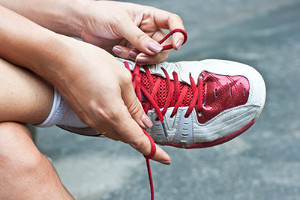 Proper support is crucial while running and is typically obtained through purchasing running shoes as opposed to shoes designed for walking. Running is considered a high impact sport, and it’s important to have the correct cushioned shoes to help promote proper balance. A firmer sole is important to a runner for maintaining stability, and a sole that’s more flexible is easier for a walker to wear as it grips the toe and the heel. Thick heels are preferred in running shoes as they provide proper cushioning and support for the jogger. If a walker should wear shoes made for running, they may experience conditions such as shin splints or Achilles tendons injuries. This is often because the mechanics of walking and running are different. Running shoes offer features designed to keep the foot in a neutral position and may provide more stability than walking shoes. An additional difference between the two types of shoes may be that running shoes are made of lighter materials that are meant to enable a jogger to move faster.
Proper support is crucial while running and is typically obtained through purchasing running shoes as opposed to shoes designed for walking. Running is considered a high impact sport, and it’s important to have the correct cushioned shoes to help promote proper balance. A firmer sole is important to a runner for maintaining stability, and a sole that’s more flexible is easier for a walker to wear as it grips the toe and the heel. Thick heels are preferred in running shoes as they provide proper cushioning and support for the jogger. If a walker should wear shoes made for running, they may experience conditions such as shin splints or Achilles tendons injuries. This is often because the mechanics of walking and running are different. Running shoes offer features designed to keep the foot in a neutral position and may provide more stability than walking shoes. An additional difference between the two types of shoes may be that running shoes are made of lighter materials that are meant to enable a jogger to move faster.
For more information about walking shoes versus running shoes, consult with Dr. Steven Schwartz from Pennsylvania. Our doctor can measure your feet to determine what your needs are and help you find an appropriate pair of footwear.
Foot Health: The Differences between Walking & Running Shoes
There are great ways to stay in shape: running and walking are two great exercises to a healthy lifestyle. It is important to know that running shoes and walking shoes are not interchangeable. There is a key difference on how the feet hit the ground when someone is running or walking. This is why one should be aware that a shoe is designed differently for each activity.
You may be asking yourself what the real differences are between walking and running shoes and the answers may shock you.
Differences
Walking doesn’t involve as much stress or impact on the feet as running does. However, this doesn’t mean that you should be any less prepared. When you’re walking, you land on your heels and have your foot roll forward. This rolling motion requires additional support to the feet.
Flexibility – Walking shoes are designed to have soft, flexible soles. This allows the walker to push off easily with each step.
If you have any questions, please feel free to contact our offices located in Chambersburg, and Mcconnellsburg, PA . We offer the newest diagnostic and treatment technologies for all your foot care needs.
How Can I Treat My Broken Foot?
If severe pain is experienced from a fall involving your foot, it is possible that there may be a fracture involving one or more bones. Symptoms often include increasing foot pain when standing or walking is attempted, in addition to swelling, bruising, and numbness in the toes or feet. There are a few different ways to diagnosis a foot fracture, one of which is having an x-ray taken. Cat scans and MRI’s can be additional tests that may be required, depending on the severity and location of the break. Treatment may include pain medicine and antibiotics, and if there are cuts on the skin, a tetanus shot may be suggested. Surgery may be an additional option depending on numerous factors. Resting and avoiding activities which may cause foot pain is recommended, in addition to elevating the foot and attempting to reduce possible swelling.
A broken foot requires immediate medical attention and treatment. If you need your feet checked, contact Dr. Steven Schwartz from Pennsylvania. Our doctor can provide the care you need to keep you pain-free and on your feet.
Broken Foot Causes, Symptoms, and Treatment
A broken foot is caused by one of the bones in the foot typically breaking when bended, crushed, or stretched beyond its natural capabilities. Usually the location of the fracture indicates how the break occurred, whether it was through an object, fall, or any other type of injury.
Common Symptoms of Broken Feet:
- Bruising
- Pain
- Redness
- Swelling
- Blue in color
- Numbness
- Cold
- Misshapen
- Cuts
- Deformities
Those that suspect they have a broken foot shoot seek urgent medical attention where a medical professional could diagnose the severity.
Treatment for broken bones varies depending on the cause, severity and location. Some will require the use of splints, casts or crutches while others could even involve surgery to repair the broken bones. Personal care includes the use of ice and keeping the foot stabilized and elevated.
If you have any questions please feel free to contact our offices located in Chambersburg, and Mcconnellsburg, PA . We offer the newest diagnostic and treatment technologies for all your foot and ankle needs.
How to Maintain Your Child’s Healthy Feet
 By the time a child is 18 years old, their feet are fully developed. When a child is 6 months old, however, most of the foot consists of cartilage and may be susceptible to deformities from shoes that fit incorrectly. Recent research suggests that being barefoot is best for healthy foot development, though it may not always be practical. The skin needs to be protected from extreme weather conditions, sharp objects, and wear and tear from walking on rough surfaces. Wearing flexible shoes will allow the feet to develop naturally while protecting the skin against harsh environments. Once the proper shoes have been chosen, the feet need to be taken care of. This may include washing the feet daily, especially drying between the toes. Additionally, measuring the feet regularly in the first 3 years of walking is important in making sure children are wearing the right size shoe.
By the time a child is 18 years old, their feet are fully developed. When a child is 6 months old, however, most of the foot consists of cartilage and may be susceptible to deformities from shoes that fit incorrectly. Recent research suggests that being barefoot is best for healthy foot development, though it may not always be practical. The skin needs to be protected from extreme weather conditions, sharp objects, and wear and tear from walking on rough surfaces. Wearing flexible shoes will allow the feet to develop naturally while protecting the skin against harsh environments. Once the proper shoes have been chosen, the feet need to be taken care of. This may include washing the feet daily, especially drying between the toes. Additionally, measuring the feet regularly in the first 3 years of walking is important in making sure children are wearing the right size shoe.
Making sure that your children maintain good foot health is very important as they grow. If you have any questions, contact Dr. Steven Schwartz of Pennsylvania. Our doctor can provide the care you need to keep you pain-free and on your feet.
Keeping Children's Feet Healthy
Having healthy feet during childhood can help prevent medical problems later in life, namely in the back and legs. As children grow, their feet require different types of care. Here are some things to consider...
Although babies do not walk yet, it is still very important to take care of their feet.
Avoid putting tight shoes or socks on his or her feet.
Allow the baby to stretch and kick his or her feet to feel comfortable.
As a toddler, kids are now on the move and begin to develop differently. At this age, toddlers are getting a feel for walking, so don’t be alarmed if your toddler is unsteady or ‘walks funny’.
As your child gets older, it is important to teach them how to take care of their feet.
Show them proper hygiene to prevent infections such as fungus.
Be watchful for any pain or injury.
Have all injuries checked by a doctor as soon as possible.
Comfortable, protective shoes should always be worn, especially at play.
If you have any questions please feel free to contact our offices located in Chambersburg, and Mcconnellsburg, PA . We offer the newest diagnostic and treatment technologies for all your foot and ankle needs.
Breaking in a New Pair of Shoes
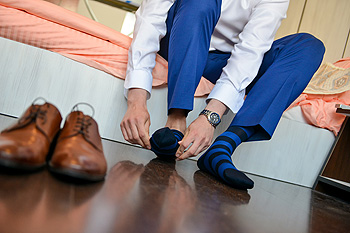 While buying a new pair of shoes can be fun, breaking them in can be painful and can cause foot conditions like blisters or sore feet. Shoes take time to break in and better conform to your foot type. While the shoes should be snug while providing enough room for your toes, they may still cause friction; this can cause blisters. There are ways you can help to break them in faster, however. One method involves wearing a pair of thick socks, heating up your shoes with a hair dryer, and then wearing them while you walk around your home. Another trick is to find an object to place in your shoe that can help expand them during the night while you sleep; this, however, may not always work, since the shoes aren’t conforming to the specific shape of your feet. Breaking in a new pair of shoes can be uncomfortable, but these steps can help make it easier on your feet.
While buying a new pair of shoes can be fun, breaking them in can be painful and can cause foot conditions like blisters or sore feet. Shoes take time to break in and better conform to your foot type. While the shoes should be snug while providing enough room for your toes, they may still cause friction; this can cause blisters. There are ways you can help to break them in faster, however. One method involves wearing a pair of thick socks, heating up your shoes with a hair dryer, and then wearing them while you walk around your home. Another trick is to find an object to place in your shoe that can help expand them during the night while you sleep; this, however, may not always work, since the shoes aren’t conforming to the specific shape of your feet. Breaking in a new pair of shoes can be uncomfortable, but these steps can help make it easier on your feet.
Everyday foot care is very important to prevent infection and other foot ailments. If you need your feet checked, contact Dr. Steven Schwartz from Pennsylvania. Our doctor can provide the care you need to keep you pain-free and on your feet.
Everyday Foot Care
Often, people take care of their bodies, face and hair more so than they do for their feet. But the feet are a very important aspect of our bodies, and one that we should pay more attention to. Without our feet, we would not be able to perform most daily tasks.
It is best to check your feet regularly to make sure there are no new bruises or cuts that you may not have noticed before. For dry feet, moisturizer can easily be a remedy and can be applied as often as necessary to the affected areas. Wearing shoes that fit well can also help you maintain good foot health, as well as making it easier to walk and do daily activities without the stress or pain of ill-fitting shoes, high heels, or even flip flops. Wearing clean socks with closed shoes is important to ensure that sweat and bacteria do not accumulate within the shoe. Clean socks help to prevent Athlete’s foot, fungi problems, bad odors, and can absorb sweat.
If you have any questions please feel free to contact our offices located in Chambersburg, and Mcconnellsburg, PA . We offer the newest diagnostic and treatment technologies for all your foot and ankle needs.
All About Cracked Heels
 Cracked heels can be an uncomfortable condition to deal with, though it is a condition that is usually preventable and treatable. The heels tend to crack for a number of reasons, such as constant pressure on the feet, obesity, vitamin deficiency, and poor hydration. To help prevent this, wear shoes that provide good cushioning for your feet. Be sure to stick to a healthy diet, and get your recommended daily value of vitamins. Drink plenty of water during the day to stay hydrated. Finally, wash your feet daily and use foot creams to keep your feet moisturized. While a pedicure can help your feet look nice, they are not meant to treat cracked heels. If you are experiencing pain or your heels do not improve, please see a podiatrist for treatment.
Cracked heels can be an uncomfortable condition to deal with, though it is a condition that is usually preventable and treatable. The heels tend to crack for a number of reasons, such as constant pressure on the feet, obesity, vitamin deficiency, and poor hydration. To help prevent this, wear shoes that provide good cushioning for your feet. Be sure to stick to a healthy diet, and get your recommended daily value of vitamins. Drink plenty of water during the day to stay hydrated. Finally, wash your feet daily and use foot creams to keep your feet moisturized. While a pedicure can help your feet look nice, they are not meant to treat cracked heels. If you are experiencing pain or your heels do not improve, please see a podiatrist for treatment.
Cracked heels are unsightly and can cause further damage to your shoes and feet. If you have any concerns, contact Dr. Steven Schwartz from Pennsylvania. Our doctor can provide the care you need to keep you pain-free and on your feet.
Cracked Heels
Cracked heels appear unappealing and can make it harder for you walk around in sandals. Aside from looking unpleasant, cracked heels can also tear stockings, socks, and wear out your shoes. There are several methods to help restore a cracked heel and prevent further damage.
How Do You Get Them?
Dry skin is the number one culprit in creating cracked heels. Many athletes, walkers, joggers, and even swimmers suffer from cracked heels. Age and skin oil production play a role to getting cracked heels as well.
Promote Healing
Over the counter medicines can help, especially for those that need instant relief or who suffer from chronic dry feet.
Wear Socks – Wearing socks with medicated creams helps lock in moisture.
Moisturizers – Applying both day and night will help alleviate dryness which causes cracking.
Pumice Stones – These exfoliate and remove dead skin, which allows for smoother moisturizer application and better absorption into the skin.
Change in Diet
Eating healthy with a well-balanced diet will give the skin a fresh and radiant look. Your body responds to the kinds of food you ingest. Omega-3 fatty acids and zinc supplements can also revitalize skin tissue.
Most importantly, seek professional help if unsure how to proceed in treating cracked heels. A podiatrist will help you with any questions or information needed.
If you have any questions, please feel free to contact our offices located in Chambersburg, and Mcconnellsburg, PA . We offer the newest diagnostic and treatment technologies for all your foot care needs.

